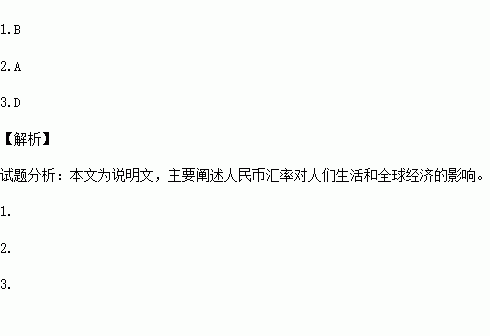ÌâÄ¿ÄÚÈÝ
Money matters, no matter who or where you are. So when China¡¯s currency the yuan was devalued (±áÖµ) against the US dollar for three straight days in mid-August, the world felt the effects. As CNN put it: ¡°If China sneezes, the world catches a cold.¡±
Why does it matter so much?
The exchange rate is the term for the comparison of two currencies. It says how much one currency is worth in terms of (»»Ëã) the other.
¡°Exchange rates play an important role in a country¡¯s level of trade. It is one of the most important determinants (¾ö¶¨ÒòËØ) of a country¡¯s relative level of economic health,¡± wrote Jason Van Bergen of Forbes.com. A higher currency makes a country¡¯s exports more expensive and imports cheaper, and vice versa (·´Ö®ÒàÈ»).
Devaluation means the same amount of RMB can be exchanged for fewer USD. For example, on Aug 11, the exchange rate of RMB to USD was 6.23, which meant $1 was worth the same as 6.23 yuan. Two days later, the rate changed to 6.4, meaning the value of RMB had dropped by 2.7 percent.
So what does a weaker currency mean for our lives?
It first affects those who want to travel to, or study in, the US. If your former classmate is leaving for a preparatory (Ô¤¿Æ) school in the US at the end of August, it now costs about 1,800 yuan more to exchange currency for 10,000 US dollars than it did earlier this month. However, since many currencies have decreased in value, the value of yuan is still relatively high despite the recent devaluation. This means it costs 1,200 yuan less to get 10,000 Canadian dollars now than it did in March.
Even if we don¡¯t have plans to travel abroad, though, we could still be affected. For example, your mother will have to pay more if she buys directly from overseas websites with US dollars. And chances are that imported chocolate and potato chips will soon be a bit more expensive in your local supermarket.
However, the weaker yuan is good news for Chinese exporters. It makes Chinese exports less expensive and it could boost the overseas sales that have been among the main reasons for China¡¯s economic growth during its rise over the past 30 years.
Just as Erik Britton of Fathom, a London-based economic consulting firm, told The Guardian: ¡°We¡¯re all going to feel it: we¡¯ll feel it through commodities (ÉÌÆ·), not just from China but from everywhere that has to compete with it; and we¡¯ll feel it through wages.¡±
¡°The devalued yuan will force China¡¯s Asian rivals (¾ºÕù¶ÔÊÖ), such as Indonesia and South Korea, to compete even harder,¡± wrote Heather Stewart, economics editor of The Guardian. ¡°The result may be cheaper Christmas presents.¡±
1.According to the passage, it can be learned from the passage EXCEPT___________
A. The higher China¡¯s currency is , the less expensive potato chips from America become.
B. In March people spent 1,200 yuan more to get 10,000 Canadian dollars than they do today because Canadian dollars increased in value.
C. China¡¯s currency¡¯s devaluation against the US dollar in mid-August makes students studying in America pay more school fees.
D. People who work in Fathom will be greatly affected on account of the weaker yuan.
2.The passage implies that ___________.
A. The yuan¡¯s devaluation contributes a lot to China¡¯s economic growth .
B.Exchange rates are the most important factor determining a country¡¯s relative level of economic health
C. The yuan¡¯s devaluation has a great impact on all the countries in the world.
D.Chinese exports sell well overseas because of their high quality
3.If the exchange rate of RMB to USD increased from 6.5 to 6.7, how much more percent would you pay when you bought a bag worth $100?
A. 2.7 B. 5.4 C.20.0 D. 3.1

